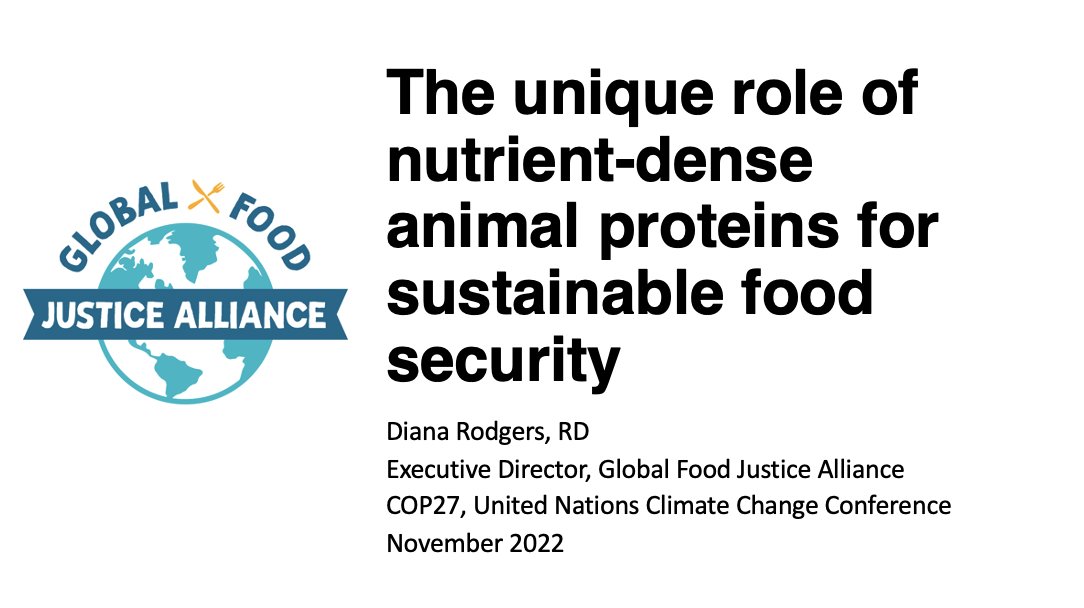Slide summary from my presentation at #COP27 about the Unique Role of Nutrient-Dense Animal Proteins for Sustainable Food Security. (thread) #meat #livestock #foodsystems #nutrition #climatechange #malnutrition #hiddenhunger #foodsecurity 

Are the charges against meat and livestock justified? Are we looking at this debate in a holistic way? Are we certain of the evidence against meat? 

Or are policymakers afflicted by "Carbon Tunnel Vision" and not taking into account the multidimensional value livestock have to human health, rural livelihoods and ecosystem function? 

1 in 2 children and 2 in 3 women worldwide have at least one micronutrient deficiency. Many children and women have multiple deficiencies. These are wreaking havoc on immune systems, hindering growth and development, and limiting human potential. h/t @TyRBeal 

Micronutrient deficiencies in women, impacting low- and middle-income countries but also high income countries. Iron deficiency alone impacting 1 in 5 women in the US, where we're told to eat less meat (the best source of bioavailable iron). 

Single micronutrient deficiencies in iron, zinc, folate, vitamin A, vitamin D, and vitamin B12 are common. As many as 40% of children and 70% of women have multiple deficiencies at the same time. *Note that animal-sourced foods are the #1 best source of all but folate. 

Not seeing anyone at the other "climate friendly diet" talks address micronutrients or show evidence that meat reduction will improve human health. A shift away from meat will only DO MORE HARM to women and children, who require these vital nutrients for cognitive development.
Evidence against eating meat is weak at best, and doesn't include the value meat brings to hidden hunger. Example - cheese consumption is associated with, but does not CAUSE death by becoming tangled in bedsheets. See also: dublin-declaration.org 

Media and scientists need to report absolute risk, not relative risk, when it comes to meat consumption. Eating 5 slices of bacon EVERY DAY only increases risk of colon cancer by 1%. This is NOT the same as smoking. 

Only RCT (experimental study) looking at meat vs. less meat is in Kenyan schoolchildren and proved meat increases academics, physical ability, and behavior. So why are we pushing Meatless Mondays and Vegan Fridays on disadvantaged kids in public schools? pubmed.ncbi.nlm.nih.gov/17374691/ 

Livestock contribute to food security, gender equality, and household nutrition status. They're also less susceptible to drought or extreme weather compared to crops. Why isn't anyone else talking about this at COP27?!? 

Plus, in most agricultural areas, livestock are the ONLY thing that can be produced for food, and again, provide BETTER nutrition than plants alone. 

Food choice is a privliege. Those with the means to push away nutrition shouldn't be creating policies that others who need/want these nutrients exclude meat, which is a nutritious, sustainable and (to most) a culturally appropriate food. This is cultural and moral imperialism. 

We need A LOT more recognition that livestock provide critical ecosystem functions and micronutrients. At COP, I see a lot of uneducated, privileged people telling everyone that global meat reduction is the answer, with no understanding of food production or nutrition.
Just because someone can afford the flight to Egypt, doesn't mean they have the understanding or right to create policies impacting those with no voice here. If you agree, please join me - learn more at globalfoodjustice.org
• • •
Missing some Tweet in this thread? You can try to
force a refresh







